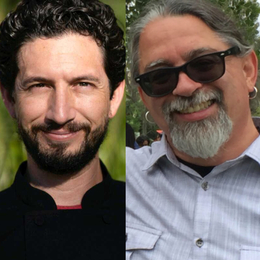Knowledge Base > Enrique C. Ochoa & Chris Rodriguez - Pull Up A Chair: Food, Labor and Climate Change

Enrique C. Ochoa & Chris Rodriguez - Pull Up A Chair: Food, Labor and Climate Change
This event was on
Wednesday, April 27, 2022 at 11:00 am Pacific, 2:00 pm Eastern
Join us for a conversation about Food, Labor and Climate Change with Professor Enrique C. Ochoa and Chef Chris Rodriguez. This is the third episode in the series called Pull Up a Cha… Read More.
Question:
I would love to hear your thoughts more about how indigenous food systems/practices might support cultural resilience among migrant workers living/working in the US.?
— Ken Rubin
Answer:
Great question right and connecting cans with Susan's question. Right? I think and and as you say to look at the way communities are responding, I think those knowledge is right. We know they're there and we know they are being right they're coming with migrants and people are are bringing those systems with them. However, right that the the Juggernaut of of industrial agriculture is there and and and again it it is helping to kind of eclipse a lot of it. But you're right Ken. I mean this question of indigenous knowledge is the the knowledge is that that communities are coming with the great movement of agroecology in the US, right? So taking agricultural methods. Connecting them to the Ecology of the land connecting them as well to indigenous ways of knowing and being right are are able to create sustainable. Communities and lands and we see that movement right that has been kind of always in existent. But really again as part of this move towards free trade and NAFTA the resistance of indigenous communities of landed communities in connection with the aggrocologists have really worked it kind of take land back where they're able to and the great I think you showed one of the the pictures there right of the zapatistas kind of taking land back and then beginning to say, okay. Well, yes, let's let's draw upon our knowledge is let's use some of the Sciences right that are out there that will colleges have have had let's wed them together and then let's focus on sustaining ourselves with the basics of right of beans a mice of calabasa of Chiles right of other foods, and and not having to import or depending on the state to you know, provide some sort of subsidies to a but instead to be able to To go back to those knowledge's and modernize them right and bring them up to speed with the different sciences that are there and they're all kind of communities right that are doing that and the potential can I think is there right the potential? Is there the question though. Are we still is what access to land do people have Right, even it within the US what access is there to land? and and I think right we see a lot of good examples that have been happening in Latin America, which has been where we've seen people and communities then say, well, you know, this is enough we need to then gain access to that land and be able to draw upon that so we can impart feed ourselves but also, right Think very hard about sourcing everything sourcing things locally thinking about eating seasonally right as opposed to having to ship things overseas and and the things along those lines so that there's a lot of that Community knowledge that's there now. It is in communities. It is. In a variety of ways there and there there are these discussions and actual projects going on. and they fully well and I think they're sustaining right there's all kinds of very important agricult work that's being done that talks about right how small farmers throughout the world are the ones that sustain the majority of people that the majority of our food and majority people are fed by small farmers. Yes, a large percentage is still right is by and large agribusiness, but small farmers Community Farmers Family farmers. Driven by women Farmers right are in the lead on that. And again that's not looked at right larger business corporate Notions of Agriculture are are not going to emphasize that instead right have to argue that they're the solution. Again, because that's kind of systemically built in there, but no you're right. From the roots from the Grassroots communities are resisting and and are able to do it. And again, I think on the link Chris on the on the page you have several really important videos. Centering compassiness. Maybe you want to mention a few of those that are there that kind of show those examples. Right on the Rouxbe event page for today's talk. There's a link that says to a PDF event document. I'm just to the side of our indican and my image and contact info, um there in that document you'll find links to important projects currently underway in that across Latin America and some sort of touching on further readings. And of course Enrique your Publications. There's linked to your Publications there as well and some further readings also, so yes, we encourage our audience to have take a look at that.
